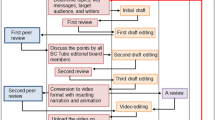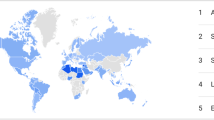Abstract
Aim
Overdiagnosis has become a major concern with the widespread use of screening tests, leading to unnecessary treatments and financial damage. However, the concept of overdiagnosis is difficult to convey to the public, and misinformation may be prevalent, especially through online platforms. This study aimed to analyze the news media and YouTube content related to overdiagnosis to determine the current state of misinformation and to provide a basis for controlling overdiagnosis-related information provision.
Methods
News articles were collected from ten media outlets and three broadcast media, while YouTube videos (published in 2005–2022) with over a thousand views were selected using the keyword “geom**” (health screening). LDA topic modeling was used to examine the news data, and the chi-square test was performed to analyze the differences in video content by source.
Results
The analysis of 268 YouTube videos showed that more than 75% of the videos recommended necessary screening. However, recommendation of screening despite insufficient evidence was found in 43.3% of all videos and showed a particularly high rate among the videos published by individual medical professionals or medical institutions (p < 0.001). Among the videos promoting screenings, 38.8% also recommended screenings to age groups that are not shown to benefit from them. In the news articles, the topic with the highest proportion (29.2%) was the “necessity of extensive and comprehensive health screening.”
Conclusion
The prevalence of excessive recommendations by healthcare professionals through news and YouTube in Korea highlights the need for communicating accurate medical information and effective policies to prevent overdiagnosis.

Similar content being viewed by others
Availability of data and material
Data available on request.
References
Albarqouni L, Arab-Zozani M, Abukmail E, Greenwood H, Pathirana T, Clark J, Kopitowski K, Johansson M, Born K, Lang E (2022) Overdiagnosis and overuse of diagnostic and screening tests in low-income and middle-income countries: a sco** review. BMJ Glob Health 7(10):e008696
Bond M, Pavey T, Welch K, Cooper C, Garside R, Dean S, Hyde C (2013) Psychological consequences of false-positive screening mammograms in the UK. BMJ Evid-Based Med 18(2):54–61
Brodersen J, Schwartz L, Heneghan C, O’Sullivan J, Aronson J, Woloshin S (2018) Overdiagnosis: what it is and what it isn’t. BMJ Evid-Based Med 23(1):1. https://doi.org/10.1136/ebmed-2017-110886
Brownlee S, Chalkidou K, Doust J, Elshaug AG, Glasziou P, Heath I, Nagpal S, Saini V, Srivastava D, Chalmers K (2017) Evidence for overuse of medical services around the world. The Lancet 390(10090):156–168
Bulliard JL, Chiolero A (2015) Screening and overdiagnosis: public health implications. Public Health Rev 36(1):8. https://doi.org/10.1186/s40985-015-0012-1
Carroll AE (2017) The high costs of unnecessary care. JAMA 318(18):1748–1749
Chen CP, Kung PT, Wang YH, Tsai WC (2019) Effect of time interval from diagnosis to treatment for cervical cancer on survival: a nationwide cohort study. PLoS ONE 14(9):e0221946. https://doi.org/10.1371/journal.pone.0221946
Chou S, Oh A, Klein WM (2018) Addressing health-related misinformation on social media. JAMA 320(23):2417–2418
Crowley R, Daniel H, Cooney TG, Engel LS, Health & Physicians (2020) Envisioning a better US health care system for all: coverage and cost of care. Ann Intern Med 172(2_Supplement):S7–S32
Dunn BK, Woloshin S, **e H, Kramer BS (2022) Cancer overdiagnosis: a challenge in the era of screening. J Natl Cancer Center 2(4):235–242
Fall K, Fang F, Mucci LA, Ye W, Andrén O, Johansson JE, Andersson SO, Sparén P, Klein G, Stampfer MJ (2009) Immediate risk for cardiovascular events and suicide following a prostate cancer diagnosis: prospective cohort study. PLoS Med 6(12):e1000197
Forstmeier W, Wagenmakers EJ, Parker T (2017) Detecting and avoiding likely false-positive findings–a practical guide. Biol Rev 92(4):1941–1968
Freer-Smith C, Harvey-Kelly L, Mills K, Harrison H, Rossi SH, Griffin SJ, Stewart GD, Usher-Smith JA (2021) Reasons for intending to accept or decline kidney cancer screening: thematic analysis of free text from an online survey. BMJ Open 11(5):e044961
Gilbert N (2020) The pros and cons of screening. Nature 579(7800):S2–S2
Guo S, Dang Y, Vogel D, She B (2023) The effect of offline medical resource distribution on online physician-patient interaction: empirical study with online and offline data. JMIR Formative Research 7(1):e43533
Győrffy Z, Radó N, Mesko B (2020) Digitally engaged physicians about the digital health transition. PLoS ONE 15(9):e0238658
Hafslund B, Espehaug B, Nortvedt MW (2012) Effects of false-positive results in a breast screening program on anxiety, depression and health-related quality of life. Cancer Nurs 35(5):E26–E34
Ioannidis JP, Stuart ME, Brownlee S, Strite SA (2017) How to survive the medical misinformation mess. Eur J Clin Invest 47(11):795–802
Kale MS, Korenstein D (2018) Overdiagnosis in primary care: framing the problem and finding solutions. BMJ 362:k2820. https://doi.org/10.1136/bmj.k2820
Lam JH, Pickles K, Stanaway FF, Bell KJ (2020) Why clinicians overtest: development of a thematic framework. BMC Health Serv Res 20(1):1–11
Levinson W, Born K, Wolfson D (2018) Choosing wisely campaigns: a work in progress. JAMA 319(19):1975–1976
Li M, Zhang L, Charvat H, Callister M, Sasieni P, Christodoulou E, Kaaks R, Johansson M, Carvalho AL, Vaccarella SJ (2022) The influence of postscreening follow-up time and participant characteristics on estimates of overdiagnosis from lung cancer screening trials. Int J Cancer 151(9):1491–1501
National Academies of Sciences and Medicine (2018) Factors that affect health-care utilization. In Health-care utilization as a proxy in disability determination. National Academies Press (US)
O’Sullivan JW, Muntinga T, Grigg S, Ioannidis JP (2018) Prevalence and outcomes of incidental imaging findings: umbrella review. BMJ 361:k2387. https://doi.org/10.1136/bmj.k2387
Schulz PJ, Nakamoto K (2022) The perils of misinformation: when health literacy goes awry. Nat Rev Nephrol 18(3):135–136
Shan Y, Ji M, **ng Z, Dong Z, Xu X (2023) Susceptibility to breast cancer misinformation among Chinese patients: cross-sectional study. JMIR Form Res 7(1):e42782
Singh H, Dickinson JA, Thériault G, Grad R, Groulx S, Wilson BJ, Szafran O, Bell N (2018) Overdiagnosis: causes and consequences in primary health care. Can Fam Physician 64(9):654–659
Srivastava S, Koay EJ, Borowsky AD, De Marzo AM, Ghosh S, Wagner PD, Kramer B (2019) Cancer overdiagnosis: a biological challenge and clinical dilemma. Nat Rev Cancer 19(6):349–358
Stewart C, Smith-Bindman R (2021) It is time to inform patients of medical imaging risks. JAMA Netw Open 4(10):e2129681–e2129681. https://doi.org/10.1001/jamanetworkopen.2021.29681
Tsao SF, Chen H, Tisseverasinghe T, Yang Y, Li L, Butt ZA (2021) What social media told us in the time of COVID-19: a sco** review. The Lancet Digital Health 3(3):e175–e194
Welch HG, Skinner JS, Schroeck FR, Zhou W, Black WC (2018) Regional variation of computed tomographic imaging in the united states and the risk of nephrectomy. JAMA Intern Med 178(2):221–227. https://doi.org/10.1001/jamainternmed.2017.7508
Wender RC, Brawley OW, Fedewa SA, Gansler T, Smith R (2019) A blueprint for cancer screening and early detection: advancing screening’s contribution to cancer control. CA Cancer J Clin 69(1):50–79
Funding
This study was supported by a Grant-in-Aid for Cancer Research and Control from the National Cancer Center of Korea (#2210250–1).
Author information
Authors and Affiliations
Contributions
All authors conceived and designed the analysis. Data collection was carried out by EKK and SK. EKK, HRJ, and JC contributed to the data or provided analysis tools. The analysis was performed by EKK, HRJ, and JC. The paper was written by all authors, and all authors supervised and revised the manuscript.
Corresponding author
Ethics declarations
Ethics approval
The authors declare that the work reported herein did not require ethics approval because it did not involve animal or human participation.
Consent to participate
Not applicable.
Consent for publication
Not applicable.
Competing interest
The authors declare that they have no known competing financial interests or personal relationships that could have appeared to influence the work reported in this paper.
Additional information
Publisher’s Note
Springer Nature remains neutral with regard to jurisdictional claims in published maps and institutional affiliations.
EunKyo Kang and HyoRim Ju contributed equally to this work as first authors.
Supplementary Information
Below is the link to the electronic supplementary material.
Rights and permissions
Springer Nature or its licensor (e.g. a society or other partner) holds exclusive rights to this article under a publishing agreement with the author(s) or other rightsholder(s); author self-archiving of the accepted manuscript version of this article is solely governed by the terms of such publishing agreement and applicable law.
About this article
Cite this article
Kang, E., Ju, H., Kim, S. et al. Excessive recommendations on health screening in Korea: analysis of news media and Youtube content related to overdiagnosis. J Public Health (Berl.) (2023). https://doi.org/10.1007/s10389-023-02182-y
Received:
Accepted:
Published:
DOI: https://doi.org/10.1007/s10389-023-02182-y




